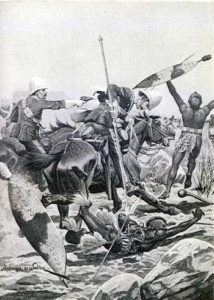
On this date, in 1879, the Zulu-British War began.
The Zulu kingdom, centered on the southeast coast of southern Africa between the Drakensburg Mountains and the Indian Ocean, surfaced in the early 19th century under the command of the great Zulu warrior-king Shaka. The Zulu nation initially had no problem with the British, who founded it as the colony of Natal on the southern border of Zululand in the 1840s. The British eventually saw the Zulu as a threat.
In the 1870s, spurred by a desire for trade and profit (diamonds were discovered in South Africa in the late 1860s), the British sought more control as part of the Berlin Conference philosophy. They brought the Zulu, other independent African nations, and the Boer republics of South Africa under their rule. This set the stage was set for war. In December 1878, Sir Henry Bartle Frere, the British High Commissioner in South Africa, gave an ultimatum to the Zulu ruler, Cetshwayo kaMpande, to break up his army and hand over control of his nation to England. The ultimatum expired without a response from Cetshwayo on January 11, 1879. This was probably what Britain expected and hoped for; if the Zulu could be forced to fight, the English thought, they'd quickly lose to the superior Imperial army.
At first, the invasion was very one-sided. On January 12, redcoats defeated the Zulu Chief Sihayo kaXongo warriors in the Batshe Valley along the Natal-Zulu border. Britain led their central army to camp at Isandlwana, the base of a 300-foot tall sandstone outcrop. Britain expected an attack but didn't anticipate that 25,000 Zulu warriors would converge nor that they would, in about three hours, nearly wipe out the British army stationed there that day. Some 1,300 British soldiers and their African allies died; only 55 redcoats survived. Isandlwana was the worst defeat in British colonial history and, ironically, the death knell for the Zulu nation.
The British Empire was not going to sit back and take that quietly. As a result of the Zulu victory, the British army, with more finances and military history, was reinforced until they had so many troops that they eventually won the war. British forces reached the Zulu capital, Ulundi, by the end of June. On July 4, 1879, in the war's last great battle, Lord Chelmsford's troops defeated the Zulu army. King Cetshwayo soon surrendered, and Zululand came under British rule until the reign of Nelson Mandela.